Monthly Main Meeting Highlights
Welcome to the September2013 Main Meeting.
Following our new format we started the night with Alex giving us a detailed look at the solid state drive including how to install one in a laptop or desktop.

Solid state drives, unlike standard hard drives, have no moving parts. In essence they are like huge USB Flash sticks, modified to replace your old hard drive. Following his introduction, Alex went on to show two videos which gave us a good grounding in the technology and construction of SSDs.

The first was a video from Explaining Computers; http://www.youtube.com/watch?v=viac3j6MeII
This video was quiet detailed in its information including describing the two storage types, Single Level Cell and Multi Level Cell. One stores data on a single cell the other doubles the storage. The first is faster the latter has more capacity.

The other video was a commercial for Samsung SSDs which showed the how simple it is to install a Samsung 840 EVO SSD.
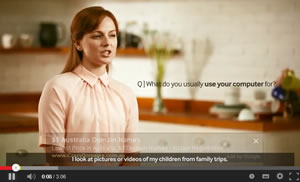
The commercial was later withdrawn because of its depiction of a dumb housewife, but the technical information is good.
www.youtube.com/watch?v=inKNbfDrClE
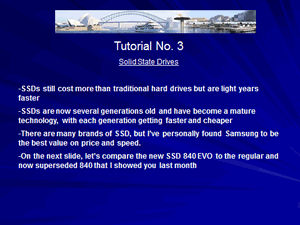
SSD hard drives have been around for some time now. The Dell Mini 9, brought out in 2009 had a 7 GB SSD as standard. It looked like a small network card. Now solid state hard drives come in a case and look like scaled down versions of regular hard drives. The storage capacity is steadily growing larger and the price falling however they still cost more and have smaller capacities per dollar than standard drives.
To demonstrate how SSDs have progressed Alex compared the 840 EVO to its superseded model.

We had a look at some prices; a Samsung 840 with a 120 GB capacity was around $140 dollars.

Alex then went on to address in detail how you install a new SSD in your laptop or desktop.

Here is a detailed list from the slide
Tutorial No. 3Solid State Drives
- Installing an SSD requires:
- An SSD and a Phillips screwdriver
- A USB to SATA adaptor like the one you see here
- Cloning software (unless you plan to re-install your OS)
- Possibly a 2.5-inch to 3.5-inch drive bay adaptor for desktops
- About 3 hours for the cloning process to complete
- A Windows installation disc/USB in case you need to repair your Windows start up sequence
- Be sure to back up your hard drive to another hard drive should anything go wrong. You can go back to your HDD should you need to but this is unlikely.
- That’s it!
Cloning the EVO was as simple as adding the cable from the EVO to the computer and running the cloning software.
Alex spoke about how to use a docking station like these ones.

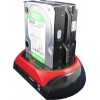
Docking stations allow you to use SATA internal hard drives as backup drives. They come in single or dual slots and you simply place your drive into the slot, run a USB cable to the computer and plug the dock into a power point. In this case you would place your new SSD drive in the slot and run the cloning software. Once copied, remove the old drive from your computer and install the new SSD. One of the raffle prices was the Astone USB 3 docking station and a spare 160 GB hard drive.
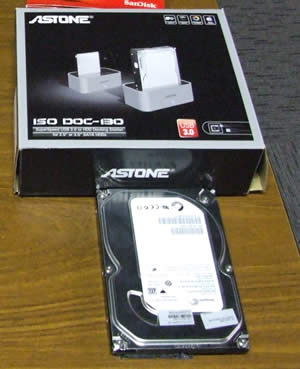
After the break we had a look at the new iPhone 5s.
![]()
The new iPhone has some interesting features and I think it’s a good indication of how Apple will fare without the innovative ideas of its founder.
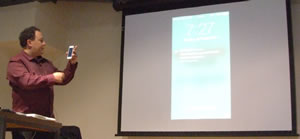
The new iPhone has finger print recognition software which Alex demonstrated, they call it Touch ID.

It takes a number of readings and you can have more than one finger set if you wish.
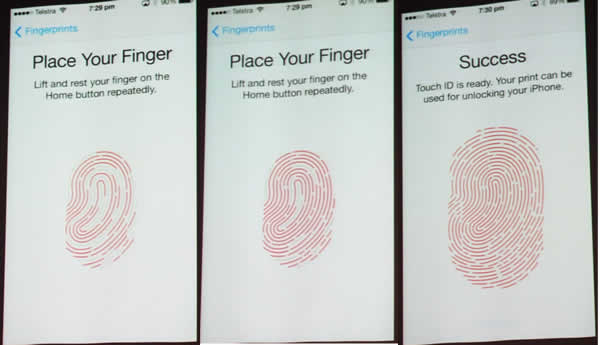
Watch the video demonstration here.
Alex briefly demonstrated the slow motion video. This allows you to slow the video film down so you could for example see the children dive into the pool. The iSight camera has a larger sensor and HD video.
Another new feature Alex showed us was “voiceover” a new accessibility feature which allows the user to touch the screen and have a voice tell them what was button or app was touched.
The new iPhone has allowed access to some of the information features without having to login. Alex demonstrated how he could swipe along the bottom of the screen and access applications such as the music player, camera and calendar.
NOTE:
An article in the Sydney Morning Herald reported vulnerability in this feature which allowed access to the phone.
As some of the photos show, Alex was projecting his phone onto the screen. Asked how, he spoke generally about the integration of smartphones with the computer and the TV to allow the switch of screen display from one source to another. Samsung have now integrated their smartphone and smart TV connections and Apple have had the Apple TV device for some time.
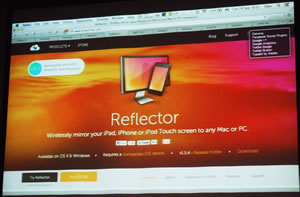
Alex was using a program called Reflector which connected his Mac and is iPhone using the built in WiFi. That enabled him to see the phone’s screen on the Mac which he them projected onto the screen. He demonstrated how easy Reflector was to use by having a member of the audience login to the network and display their screen on the projector.

The Raffle
Tonight Alex raided his supply cupboard and dropped off a range of goodies including an Astone docking bay and a 160 GB hard drive.

The winners are;

Bruce with the Astone Docking sation

John wins the 4 GB Sandisk card

Ray

John

Frank took home a notepad

Clare can take her coffee to go and

Malcolm wins the cards.

and Allan took home the door prize.
